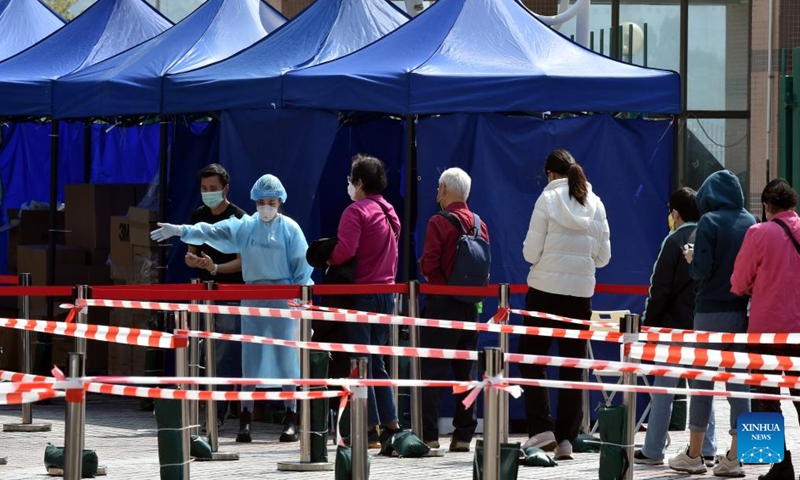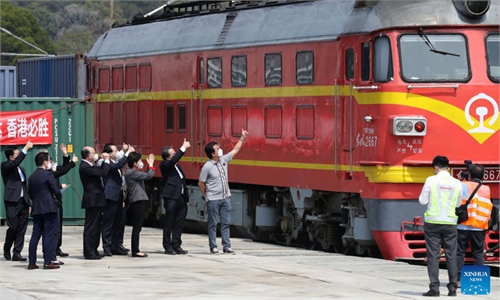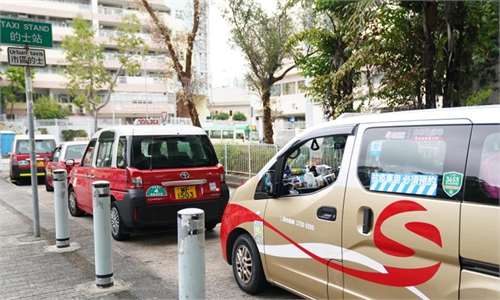Central govt 'concerned about epidemic in HK'
Vice Premier Han Zheng meets SAR deputies to NPC

People line up to have COVID-19 nucleic acid tests at Tsing Yi mobile test site in Hong Kong Special Adminisrative Region, south China, Feb. 27, 2022. (Xinhua/Lo Ping Fai)
Chinese Vice Premier Han Zheng on Monday expressed the central government's concerns about the raging COVID-19 epidemic in the Hong Kong Special Administrative Region (HKSAR), as he met with HKSAR deputies to the country's top legislature in Beijing.
Deputies who attended the Monday session with Han, who is also a member of the Standing Committee of the Political Bureau of the Communist Party of China Central Committee, told the Global Times that among all topics, the central government is most worried about the epidemic in Hong Kong.
It's an urgent issue for the city to take decisive and effective measures in order to lower the death toll, Chan Yung, a Hong Kong deputy to the National People's Congress (NPC), told the Global Times.
While the city's government has the principal responsibility of fighting the epidemic, different departments, all civil servants and all sectors of society should unite and go all out to combat the outbreak, Chan quoted Han as saying.
Another NPC deputy, Ip Kwok-him, told the Global Times that the Chinese mainland-Hong Kong border reopening was originally set at January 9, but the fifth wave dominated by the Omicron variant interrupted the plan.
The central government deemed the situations of minors and the elderly as the most worrisome, and stressed medical staff should take all necessary measures to save lives, Ip said.
Xia Baolong, director of the Hong Kong and Macao Affairs Office of China's State Council, also attended the session.
Hong Kong on Monday reported 25,150 new cases, the third consecutive daily drop, but some warned that the number could spike again after an online platform for people to report quick test results was adopted Monday.
Another 280 deaths were reported, bringing the death toll in the fifth wave to 2,074. Some 85 percent of local care centers have discovered infections, and elderly patients who had not completed vaccination suffered more serious symptoms and higher death rates, media reports said.
On Sunday, Han met with the Hong Kong political advisors attending the fifth session of the 13th National Committee of the Chinese People's Political Consultative Conference (CPPCC), where he called on private hospitals to do more and asked authorities to prioritize care for the elderly.
Pledging full support for the city, including supplies of necessities, Han asked if private hospitals are rejecting patients, according to media reports. The chairperson of the Hong Kong Private Hospitals Association Ho Shiu-wei said the private sector has been helping based on its capabilities.
Lau Siu-kai, deputy head of the Chinese Association of Hong Kong & Macao Studies, believed that Han's Sunday remarks were meant to urge the HKSAR government to take responsibility and allocate resources to ease the burdens of public hospitals.
The Hong Kong hospital authority is not authorized to directly manage private hospitals, according to HKSAR rules.
"The HKSAR government should think about how to play a coordinating role between the private and public sectors, rather than be limited by regulations and procedures," Lau told the Global Times on Monday.
Hong Kong media outlets, including hk01.com, reported that another Vice Premier - Sun Chunlan, who has been in charge of China's epidemic control since the outbreak - had given guidance on the HKSAR's relevant work, but did not give details.
Lau interpreted the senior officials' remarks as indicating discontent to the effectiveness of counter-epidemic work.
The requirements also signal that the central government is about to enhance guidance of Hong Kong's epidemic control, and accountability may be strengthened, the expert said.
Lau warned that the epidemic in Hong Kong would lead to social chaos and dissatisfaction toward the HKSAR government, which could develop into a crisis and affect local governance and political stability, even though radical anti-government forces have been curbed.
The mainland has assisted the HKSAR in nucleic acid testing, supplies of necessities and building of nine isolation facilities. Mainland expert teams, including one led by Liang Wannian, head of the National Health Commission's expert team, have been to the city to aid the local battle against the outbreak.
A spokesperson for the HKSAR government on Sunday expressed appreciation for the mainland's assistance in different sectors, including donations of 1.4 million test kits, 300,000 masks, 11,000 protective outfits, 2,200 beds and HK$15 million ($1.92 million).
The city now has 23 community quarantine facilities, including some built under mainland assistance. The average occupancy was 40 percent, local media reported.



